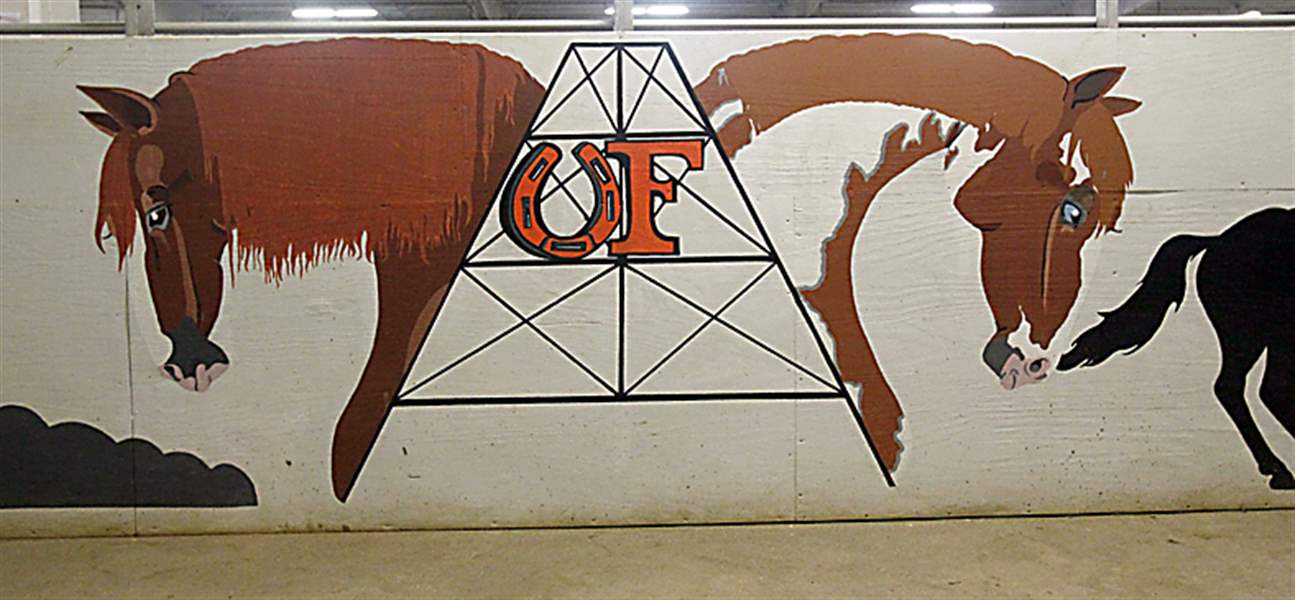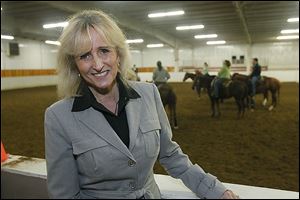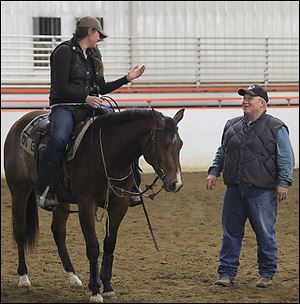
Findlay’s equestrian program features new leader at reins
University draws longtime riders and as well as novices
2/26/2013
The University of Findlay offers an equestrian studies program — in both English and western disciplines — with degree programs within the equestrian studies and equine business management majors.
THE BLADE/JETTA FRASER
Buy This Image

The University of Findlay offers an equestrian studies program — in both English and western disciplines — with degree programs within the equestrian studies and equine business management majors.
FINDLAY — Sara Glantz grew up around horses and wanted to pursue her equestrian passion in college.
That’s how the student from California’s Napa Valley ended up at the University of Findlay training a 2-year-old gelding from Arkansas. Ms. Glantz, 21, who is studying equine science with a western riding emphasis, and equine business management, wants to work as a breeding assistant or manager after graduating from the university in May.
Explaining to others that she’s studying horses, of course, isn’t always an easy conversation.
“I tell them I get to do what I love every day,” she said. “But they don’t understand what all that entails — that there’s a lot more than just riding horses.”
Students enrolled in Findlay’s equestrian studies programs do much more than play with ponies. They attend lectures, clean stalls, and spend several hours five days a week riding and training horses, in addition to completing core subject requirements.
Findlay, in Hancock County, is one of roughly 100 U.S. colleges that offer some type of equine program. The university’s equestrian and animal science programs previously shared a director, but the two programs have grown enough to warrant their own leaders. About 50 students enrolled in the western equestrian program when it launched in 1976.

Jill Paxton is the new director of equestrian studies and equine management at the University of Findlay. She has worked for the Iowa Department of Agriculture and Alfred University in New York.
Two weeks ago, Jill Paxton started in the new position of director of equestrian studies and equine management. She supervises equine programs, which includes 114 western riding students and 70 English riding students, and is in charge of events and fund-raising, among other tasks.
The private university operates two equestrian facilities: a 153-acre western farm and a 32-acre English facility where students pursue a hunter-jumper or dressage focus.
Ms. Paxton has a background in both the English and western disciplines. She was just an infant when she first got on a horse, prompted by her mother’s experience with horses. She did the same when her children were young, sitting behind them in a saddle.
“The good news is I can bring a skill set on each side, and I care passionately about the industry,” she said.
Prior to arriving in Findlay, she regulated greyhound and horse racing for the Iowa Department of Agriculture and Land Stewardship as bureau chief and was the equestrian program director at Alfred University in New York. She has a master’s degree in physical education and kinesiology/motor learning from the University of Delaware and plans to continue training horses after adjusting to the new job.
Among her goals is to launch a “design your own major” program so students can combine another academic program with equestrian studies. A psychology student, for example, could add equestrian courses for a career in equine-assisted psychotherapy. Equestrian students find employment in a variety of fields, officials said, including breeding, racetracks, designing jumping courses, and working for tractor or feed companies.
“Even the ones that don’t go into the horse industry, they learn a work ethic out here,” said Steve Brown, director of western riding.

University of Findlay student Bekah Irish speaks with riding instructor Art O'Brien. At present, 184 students — 114 in western riding and 70 in English riding — are enrolled in the program at the Hancock County institution.
Dave Delli Santi, 20, a junior from Randolph, N.J., wants to train horses after he’s finished with his studies. His grandfather had racehorses, and Mr. Delli Santi started riding at age 6. He gravitated toward roping and rodeo, and friends back home call him “the cowboy.” He decided to attend Findlay because of its “big reputation” in the horse industry.
He and other students devote many hours each week to working with horses. The university owns some and others — such as McDreamy, the Arkansas horse Ms. Glantz has trained since January — are owned by people who send their horses to Findlay to be trained by students.
Freshmen and sophomore students in the English and western programs pay more than $17,000 a semester in tuition; financial aid is available. The program attracts experienced riders and students who have rarely ridden but love horses.
“You’ve probably had a care and commitment and passion for horses even if you didn’t own one; but you read every book, and you bought all the plastic horses,” Ms. Paxton said.
Contact Vanessa McCray at: vmccray@theblade.com or 419-724-6065.